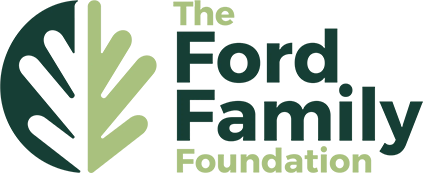Alumni ambassadors support scholarship hopefuls with information, encouragement and life experiences
Christian Hargrove knows all about the barriers faced by rural young men when it comes to charting a path toward college. As a high school student in Union County, Hargrove knew he wanted to attend college — he just didn’t know how to get there. Application information was sparse, family resources were limited and his grades were just okay. He filled out an application anyway, and the invitation to become a Ford Scholar, Class of 2012, completely changed his trajectory.
Today, Hargrove works as the facilities operations specialist for the Oregon Department of Fish and Wildlife’s Lookingglass Hatchery near Elgin. He spends much of his time providing the encouragement that helps low-income, rural students take the same chance he did. As an alumni ambassador, he makes sure information on the Ford scholarship programs is easily accessible to schools in his area, and applicants feel supported.
“The Foundation saw something in me and that’s what I look for in other students,” he says. “This is a life-changing scholarship and we just don’t have enough kids, especially in rural areas, who know about it.”
Alumni ambassadors like Hargrove are a powerful tool in the Foundation’s strategy of meeting people where they are. “The connections that we have with alumni have allowed us to engage hard-to-reach folks,” says Denise Callahan, director of Postsecondary Success. “Our alumni have helped us to dig deeper in finding potential Scholars for our programs in ways that we hadn’t been able to do before.”
The program has grown in recent years, as ambassadors are carefully chosen to represent priority demographics. Some volunteers are people of color. Others are single parents. Some come from tiny towns. Many are first-generation graduates. Others arrived at college after years of traveling other paths.
Alumni ambassadors are in all of those spaces, and many more. Their expertise helps surmount language, geographic, gender and other barriers as they seek out and engage with potential scholars. Most importantly, they share their experiences widely — in webinars, at conference events, through videos and one on one with interested students.
Alumni Ambassador Daisy Tapia Gonzalez remembers the worried faces of a student’s parents as they visited her table at a recent recruiting event for The Ford Family Foundation scholarship programs. The parents, who did not speak English, turned to their daughter. Did Daisy speak Spanish? She did, and their relieved faces made it easy to have a conversation about how the scholarship could benefit their daughter.
“Most of the Hispanic high school students I encounter are first generation,” Tapia says. “Their parents don’t know the process and they have no one to talk to. They can better relate to someone like an ambassador that has been through it all.”
Now the communications and community outreach coordinator for Woodburn School District, Tapia encourages her young mentees to start thinking about scholarships early, reminding emphasizing the importance of good grades, community involvement, and volunteering

“I think the ambassador program is one of the things I’m most proud of in collaboration with our alumni,” says director of Postsecondary Success, Denise Callahan. “It has really taken off.”
Ford ReStart (now Opportunity) Scholar John Rower began volunteering as an ambassador out of gratitude for the “life-changing” scholarship he received. Rower says he dabbled in college for several years after high school, but felt pretty rudderless. Rower’s plans eventually crystalized in his late 20s after getting married and starting a family. He joined the Air National Guard, began working in community health and eventually received degrees as a paramedic and in nursing. He now works as a nursing manager for PeaceHealth’s psychiatric unit and is pursuing a master’s degree.
“The scholarship was the beginning of seeing my life differently,” he says, a perspective he gladly shares with others looking at a later start to college. “Being able to share my story … it’s so important for people to hear from those who have achieved similar goals and have someone who can guide them. I have seen it have a very motivating effect.”
Tapia sees the ambassador program as having a powerful impact on building the scholarship pool, particularly among the Hispanic students she talks to. Her last webinar session was entirely in Spanish, with parents and students asking a host of questions about applications and financial aid. “We can provide valuable guidance and motivation since we have gone through the process,” she says. “They look up to that; it’s really powerful.” “I think the ambassador program is one of the things I’m most proud of in collaboration with our alumni,” Callahan says. “It has really taken off.”

